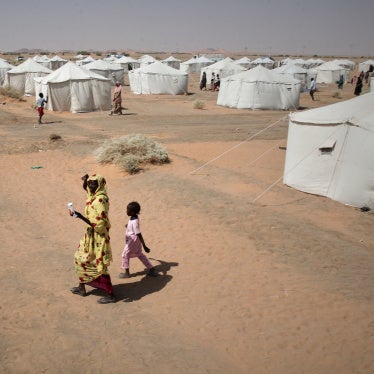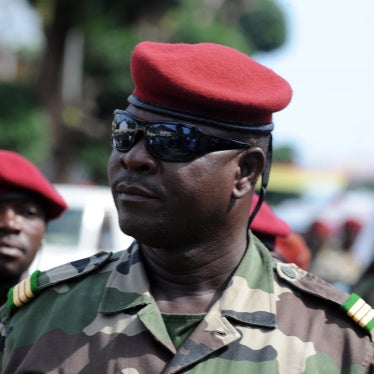(Johannesburg) – Côte d’Ivoire should either surrender a notorious militia leader to the International Criminal Court (ICC) or formally contest transferring him if it intends to try him domestically, Human Rights Watch said today.
On September 30, 2013, the ICC unsealed an arrest warrant against Charles Blé Goudé, a longtime militia leader associated with the country’s former government, for his alleged role as an indirect co-perpetrator of four counts of crimes against humanity. Blé Goudé has since January been detained in Côte d’Ivoire, where he faces domestic charges for war crimes, murder, kidnapping, and economic crimes committed during the country’s 2010-2011 post-election violence. Blé Goudé fled to Ghana, but was arrested by authorities there on January 17 and extradited to Côte d’Ivoire a day later.
“Victims and family members of people killed, tortured, and tormented by Blé Goudé’s Young Patriots militia deserve justice,” said Matt Wells, West Africa researcher at Human Rights Watch. “Now that the ICC warrant has been unsealed, the Ivorian government should waste no time in surrendering him to The Hague or in making the case to the ICC judges that they can and will move forward with a fair trial in Côte d’Ivoire.”
The November 2010 presidential election triggered six months of grave human rights abuses after the former president, Laurent Gbagbo, refused to yield power when internationally-recognized results declared his opponent, Alassane Ouattara, the victor. During the period of violence, at least 3,000 people were killed and more than 150 women raped, often in targeted acts by forces on both sides along political, ethnic, and religious lines.
A report Human Rights Watch released in October 2011 detailed serious international crimesby both sides and implicated 13 military and civilian leaders as among those responsible, including Blé Goudé. A national commission of inquiry established by Ouattara, an international commission of inquiry established by the United Nations Human Rights Council, and international and Ivorian human rights groups have all released findings implicating both pro-Gbagbo and pro-Ouattara forces in war crimes and likely crimes against humanity.
The Ivorian government should make its position known on Blé Goudé as quickly as possible, including, if necessary, through what is known as an admissibility challenge to the ICC, Human Rights Watch said. In making the decision, the Ivorian government should examine whether its judicial system is equipped to oversee Blé Goudé’s case in a way that would protect witnesses and ensure the defendant’s full rights, consistent with Côte d’Ivoire’s obligations under the International Covenant on Civil and Political Rights.
Human Rights Watch published a report in April 2013 that included specific recommendations to the Ivorian government aimed at strengthening the capacity of judges and prosecutors working on cases of serious crimes committed during the crisis.
Under the Rome Statute, which established the ICC, it is a court of last resort – intervening when national authorities are unable or unwilling to prosecute atrocity crimes. When the ICC issues an arrest warrant, national authorities must either surrender the suspect or submit an admissibility challenge to the ICC, demonstrating that they will effectively try the person domestically for substantively the same crimes. Côte d’Ivoire ratified the Rome Statute in February.
Blé Goudé is the second suspect subject to both an unsealed ICC arrest warrant and an ongoing investigation in Côte d’Ivoire for violent crimes. On September 20, Ivorian authorities announced that they would contest the transfer of the former first lady, Simone Gbagbo, in response to the warrant the ICC unsealed against her on November 22, 2012. The Ivorian government has since filed an admissibility challenge with the ICC registrar, stating its intention to try her in Côte d’Ivoire. Ivorian authorities have charged her with genocide and economic crimes, and began preliminary hearings for the case in November 2012.
The ICC judges will ultimately decide whether the Ivorian government has demonstrated the will and capacity to try Simone Gbagbo for substantially the same crimes as the ICC has charged her with. The judges will do the same for any other suspect whose transfer the Ivorian government challenges. If the judges reject the Ivorian government’s admissibility challenge for Simone Gbagbo, the government must be ready to cooperate and surrender her to the Court, Human Rights Watch said.
On November 29, 2011, Laurent Gbagbo was the first person arrested and surrendered to the ICC for the crimes committed during Côte d’Ivoire’s post-election violence, facing charges as an indirect co-perpetrator of four counts of crimes against humanity. He is the first former head of state in ICC custody. In June, the ICC Pre-Trial Chamber asked its Office of the Prosecutor to consider providing additional evidence before the judges decide whether to confirm the charges against Gbagbo.
The ICC prosecutor should also move expeditiously in investigating and, evidence permitting, bringing charges against those loyal to Ouattara who are implicated in serious international crimes during the post-election period, Human Rights Watch said.
The ICC has so far only focused on Gbagbo loyalists, with the court yet to issue arrest warrants against anyone from the Ouattara side. This is in large part because the ICC decided to pursue a “sequential” approach, investigating the Gbagbo side first and then the Ouattara side.
The ICC Office of the Prosecutor has repeatedly stressed the impartiality of its work and indicated that its investigations are ongoing. In meetings with Human Rights Watch, Ivorian civil society activists have raised concerns, however, that progress in prosecutions against only the Gbagbo camp feeds the perception that the ICC is “playing politics” in its investigations, which may stoke further tensions.
The ICC prosecutor’s decision to pursue only one side at a time is particularly problematic in Côte d’Ivoire because it is perpetuating the appearance of one-sided justice within the country, Human Rights Watch said. National courts have a crucial role to play in holding perpetrators to account, and the Ouattara government has notably established a special investigative cell tasked with investigating post-election crimes and bringing those responsible to account through trials.
However, military and civilian prosecutors have so far charged no one from the pro-Ouattara forces with post-election crimes, while bringing charges against more than 150 people from the Gbagbo side, including at least 55 civilian and military leaders for serious violent crimes.
Investigations at the national level also appear disturbingly one-sided. The UN secretary general reported in July that only 3 of the 207 investigations opened following the national commission of inquiry report – which documented hundreds of summary executions by forces on both sides – relate to suspects from the pro-Ouattara forces. Key Ivorian officials have publicly cited the ICC’s sequential investigations as justification for following a similar approach.
Luis Moreno-Ocampo, then the ICC prosecutor, said publicly in December 2011 that a lack of funds threatened to impede the office’s investigations into crimes committed by pro-Ouattara forces. States parties to the ICC should support the prosecutor’s investigations with increased resources as needed, Human Rights Watch said.
“Victims of crimes committed by the pro-Ouattara forces have found no recourse to justice at home,” Wells said. “To maintain its credibility in Côte d’Ivoire, the ICC needs to step up and fill this gap, making clear that accountability for serious crimes is the same for the victors and as for the defeated.”
Background
The ICC prosecutor submitted a request on June 23, 2011, to open an investigation into crimes committed following the November 2010 presidential election in Côte d’Ivoire, after successive Ivorian presidents had submitted declarations giving the ICC jurisdiction for serious international crimes. A decision by the ICC prosecutor to act on his own initiative to open an investigation – known as using his propio motu power – requires approval by the ICC judges. The ICC judges authorized the prosecutor to open an investigation on October 3, 2011, citing evidence of war crimes and likely crimes against humanity by both sides’ armed forces and allied militia groups.
The prosecutor initially asked the judges to authorize opening an investigation for crimes committed since November 28, 2010. The judges subsequently expanded the authorization to include crimes within the court’s jurisdiction committed since September 19, 2002.
The ICC issued a sealed arrest warrant against Blé Goudé in December 2011 and a sealed arrest warrant against Simone Gbagbo in February 2012. A key issue for Blé Goudé to answer is whether he incited crimes during the post-election period. On February 25, 2011, in a speech broadcast widely on national television and radio, Blé Goudé called on his followers to set up neighborhood roadblocks and “denounce” foreigners – a term the Gbagbo camp often used to signify northern Ivorians and West African immigrants. Human Rights Watch documented a sharp increase in violence by pro-Gbagbo militias, generally along ethnic or religious lines, in the days following Blé Goudé’s speech.
The 2010-2011 post-election violence capped more than a decade of human rights abuses in Côte d’Ivoire, beginning with violence following the 2000 election and a 2002-2003 armed conflict and its aftermath. No one was credibly prosecuted for the crimes of this period, and a 2004 UN Commission of Inquiry report on crimes during the 2002-2003 conflict has been kept secret.
Ivorian authorities have prosecuted some members of Ouattara’s Republican Forces for crimes committed subsequent to the post-election crisis. However, there has been no accountability for politically sensitive cases, including the post-election crisis and a July 2012 attack on an internally displaced persons camp outside the town of Duékoué.








